Southerners on New Ground (SONG): Then and Now
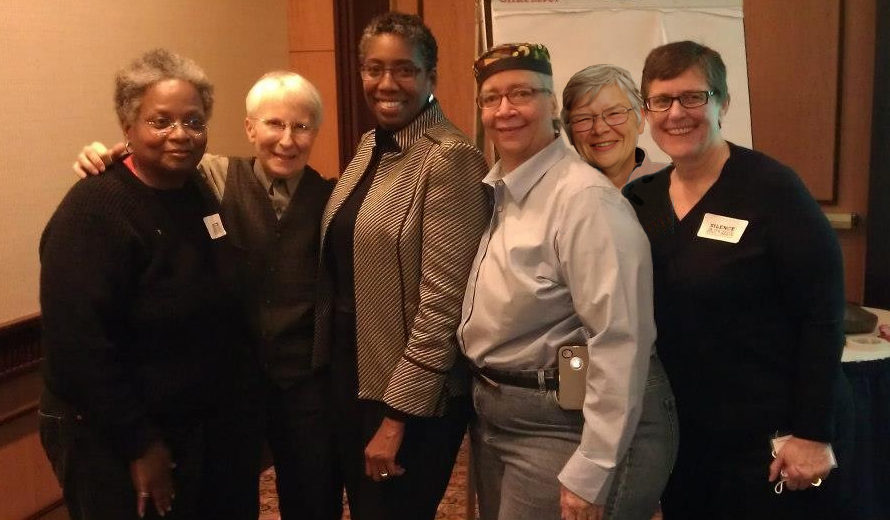
Southerners on New Ground (SONG) is an organization formed in 1993 to establish coalitions for social change. Interviews with all six founders are online.
By Rose Norman
In 1993, Creating Change, the annual conference of the National Gay and Lesbian Task Force (NGLTF), met momentously for the first time in the South, in Durham, North Carolina. The NGLTF had not planned it that way, but they had lost their conference venue. A frantic friend asked Mandy Carter if she could organize it in Durham. Here’s how Carter describes what happened next:
I enthusiastically agreed, knowing what a good base of gay and lesbian activists we had in the area. Then we started getting phone calls from people coming to the conference asking things like, “Is there an airport down there?” and “Why are we holding it in North Carolina? Isn’t that where Jesse Helms is from?” I told them “We’re holding it in North Carolina precisely because that’s where Jesse Helms is from.”[1]
Mandy Carter promptly organized a Creating Change workshop with Mab Segrest, Pat Hussain, and Suzanne Pharr about “living and organizing in the South.” Pam McMichael attended that workshop. Conversations among those five, skilled organizers led to the formation of Southerners on New Ground (SONG), an organization that Carter describes as “building transformative models of organizing in the South” that would “connect race, class, culture, gender, and sexual orientation.”

What Made SONG Possible
Pam McMichael says that several things came together at Creating Change to make SONG possible:
Having Creating Change in the South for the first time; having the first race, class, and gender institute; the things in the air around the right wing’s anti-gay activities, including the distribution of the divisive video Gay Rights/Special Rights, which situated LGBTQ people as the enemies of people of color; NAFTA being discussed at the time – all of that created opportunity to push the envelope about why, for example, we should be talking about something like NAFTA at a gay conference… As soon as SONG formed, we became the organizing body for the NGLTF institutes on race, class, and gender.
Mab Segrest adds this about her role in that Creating Change conference:
I was asked to do a keynote, and I wanted to take the opportunity to educate those coming to the South, who may have lots of preconceptions about the importance of understanding global forces of white supremacy and understanding globalizing capitalism, about how to respond to far right activists like Jesse Helms. I drew on my work with the Southeastern Economic Justice Network to place questions of class in the context of the histories of white supremacy and capitalism, rather than only viewing class as identity. NAFTA was the one example I used, and at times the content of the speech has been remembered only as debates about “NAFTA.” I was proud how subsequent SONG directors republished the text to remind SONG members of the broader, global contexts in which SONG was founded.[2]
And Then There Were Six
Joan Garner was added to their nascent group in January 1994. They were meeting in Garner’s Atlanta, Georgia, home, laying the groundwork and making decisions about how to set up their new organization. Because of the importance of intersectionality, it was critical to them to set up shared leadership between races. Thus, there would always be two codirectors in their time, one white and one Black. Pam McMichael and Pat Hussain were SONG’s first codirectors.
Pat Hussain was known for saying, “I refuse to choose between my skin, my ovaries, my wallet, and my partner, Cherry. I’m all one person.” In her interview, she speaks to the compartmentalization that she felt as an activist in several different organizations:
What had happened was that a lot of work from various organizations, in ways, chose a piece of me – the NAACP or NOW – [ways] that were compartmentalized, that didn’t embrace me as a whole human being. The same happened with lesbian feminism: it was about white lesbians and their experience… There were always, let’s say, invisible hurdles.
SONG addressed those “invisible hurdles” head on, working always to build alliances, notably within the organization itself as well as in its work with other organizations.
Founders Were Geographically Dispersed
The six founders lived in four Southern states. Mandy Carter, originally from New York, and Mab Segrest, originally from Alabama, lived in Durham, North Carolina. Suzanne Pharr, originally from rural Georgia, was in Little Rock, Arkansa. Pam McMichael, who grew up in rural Kentucky, was in Louisville, Kentucky. Joan Garner, originally from Washington, DC, and Pat Hussain were in Atlanta, Georgia. In those pre-Zoom days, it was challenging to get together in person. All of them seasoned activists accustomed to traveling, they were charged up for change.
Lifetime Activists Made SONG
These six lesbians had already accomplished a lot through social justice activism.
Mandy Carter came from the War Resisters League. In 1990, Carter was campaign manager for a North Carolina PAC that attempted to defeat Senator Jesse Helms. Highly skilled in political activism, she had also been a producer of Rhythm Fest, a women’s music festival in the South with a strong political focus, from 1990 to 1995.
Mab Segrest, during that time, was director of North Carolinians Against Racist and Religious Violence (NCARRV), an antiracist organization that she wrote about in Memoir of a Race Traitor (1989, 2nd ed. 2020). She had also been a cofounder of Womonwrites: the Southeast Lesbian Writers Conference, an annual gathering that lasted for forty years, from 1979 to 2019.
Pat Hussain’s activism was focused on racial justice and LGBTQ equality. Among other actions, she was a key organizer of grassroots, cross-race work to counter anti-gay discrimination in the 1996 Olympic Games in Atlanta, Georgia, the on-the-ground details of which are chronicled in a book she co-authored, Olympics Out of Cobb. Hussain turned down a position with the NGLTF in favor of SONG.
Joan Garner was since 1993 the Director of the Fund for Southern Communities, an organization that fosters social change in Georgia, North Carolina, and South Carolina. In later years, Garner won elected office three times to the Fulton County Commission. (Fulton County is the largest county in Georgia by population, and it includes part of metro Atlanta and beyond).
Suzanne Pharr founded the Arkansas Women’s Project in 1981, an organization focused on preventing domestic violence. Pharr is best known for her book, Homophobia: A Weapon of Sexism (1988; updated 1997). Later on, Pharr broke new ground as the first woman to direct the Highlander Research & Education Center, a historic, civil rights organization based in New Market, Tennessee, which focuses on social and economic justice.
Pam McMichael had gone to Nicaragua as part of the Alliance Against Women’s Oppression. McMichael was active in Kentucky’s Fairness Campaign, working for LGBTQ protections with antiracism at its core.[3] McMichael also later directed the Highlander Research & Education Center for twelve years and was a key cofounder of Showing Up for Racial Justice (SURJ).
SONG has been particularly strong in building alliances across racial barriers. Joan Garner describes this aspect of what they accomplished.
We brought Black women and white women. We brought in younger people. We even brought in men at one time (there are men involved now). We did not want to marginalize our work. We wanted it clear that there is no hierarchy of oppressions, and that if I go to a [negotiating] table, I’m going to bring all of my issues with me… We also didn’t want to be pitted against each other. At the time when we were forming SONG, there was a lot of controversy going on around the gay rights movement being compared to the civil rights movement. Black people did not want to be compared to white, gay men. The gay movement then was primarily seen as white, gay men; and that was not the civil rights movement. We wanted to break down those barriers and get to the root causes of why there is so much hatred and discrimination.
What They Did After SONG
Five of the six SONG cofounders are still alive and still politically active as of 2022. Sadly, Joan Garner died of breast cancer in 2017, age 65, while still serving as a Fulton County Commissioner. The five others are retired or semi-retired from their professional jobs; but a lesbian-feminist activist never truly retires.
Mandy Carter founded the National Black Justice Coalition (NBJC) in 2003, and in 2013, Carter coordinated the Bayard Rustin Commemoration Project of the NBJC. She is an organizer extraordinaire and a highly-sought speaker.
In 2009, Pam McMichael cofounded Showing Up for Racial Justice, a national organization bringing white people into the work for racial and economic justice, and is still active, as well as with the Poor People’s Campaign.
Mab Segrest and Suzanne Pharr recently published books.
Mab Segrest has returned to Durham, North Carolina, after many years in an endowed chair at Connecticut College. In 2020, Segrest published the results of her extensive research about the intersection of prisons, insanity, and racism in Georgia, Administrations of Lunacy: Racism and the Haunting of American Psychiatry, the story of the Milledgeville Asylum in Georgia, at one time the largest state hospital in the world with 25,000 graves on its property.
Suzanne Pharr’s book, Transformation: Toward a People’s Democracy, came out in 2021. She documents decades of her lifetime devoted to intersectional social justice activism.
What Made SONG Endure
In 2023, SONG celebrates its thirtieth anniversary (https://southernersonnewground.org/). Today, SONG remains a strong, intersectional organization with chapters in several Southern cities. They publish a blog in both English and Spanish; and they have several working groups. In 2019, SONG had revenue of $3.7 million, primarily from foundations and other philanthropic organizations.
Suzanne Pharr emphasizes what made SONG strong and enduring:
We were not only committed to working across race, class, gender, and sexuality; we refused to let these be separated. Similarly, we were committed to working in small towns as much as in cities. And we brought people together who weren’t accustomed to sitting in the same room together. We built deep relationships from sharing stories and songs and deep dives into our culture. We did not try to accommodate people to the times we were living in, but instead, we worked together to fearlessly change the way things were. SONG was a pioneering organization in the South.
The Six SONG Founders
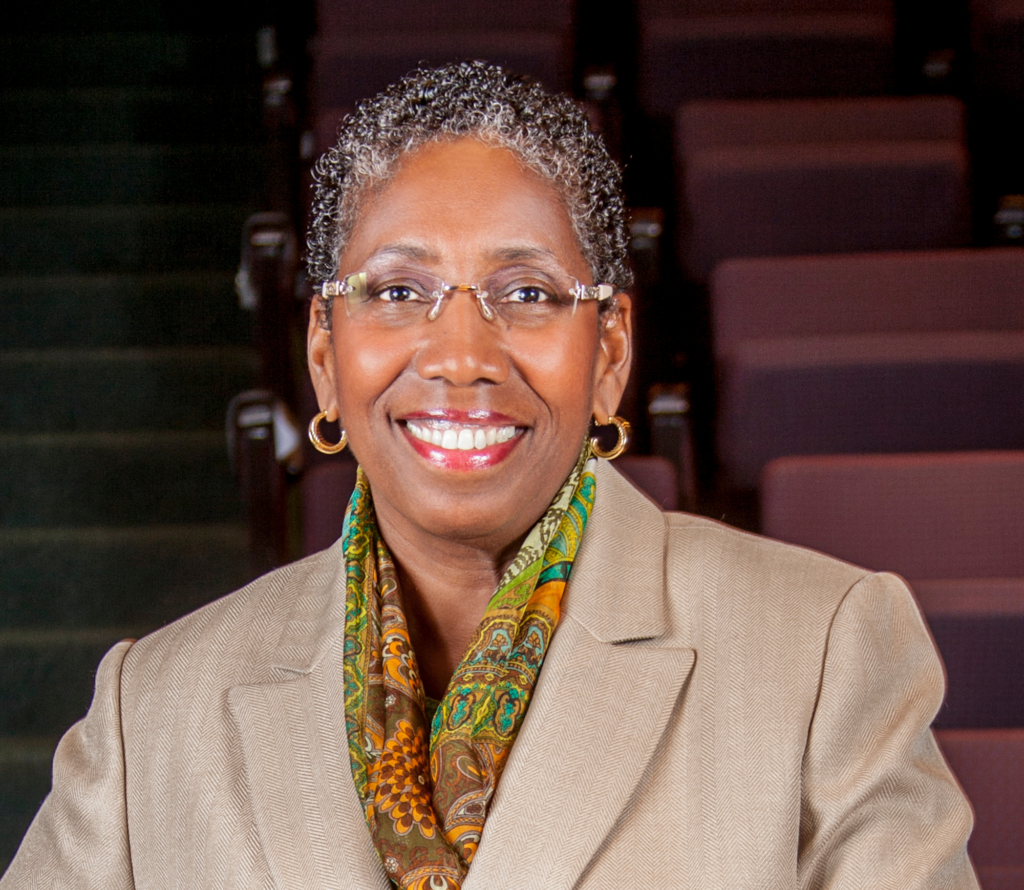
Joan Garner, born in 1951 and died in 2017, was raised in her natal Washington, DC. She lived in Atlanta, Georgia, for most of her adult life. She majored in English at the University of the District of Columbia, and earned a master’s degree in organizational communication from Howard University. From 1993 to 1997, she was director of the Fund for Southern Communities, an organization that fosters social change in Georgia, North Carolina, and South Carolina. (Read full bio)
Mab Segrest, born in 1949, has organized, taught, and written for progressive movements for over forty years, dedicated to create intersections of race, gender, sexuality, and class as laid out in the Combahee River Collective Statement. Segrest worked on the collective of Feminary to make it a “feminist journal for the South” that emphasized “the lesbian vision,” providing crucial, early feminist and lesbian analysis of southern culture. (Read full bio)
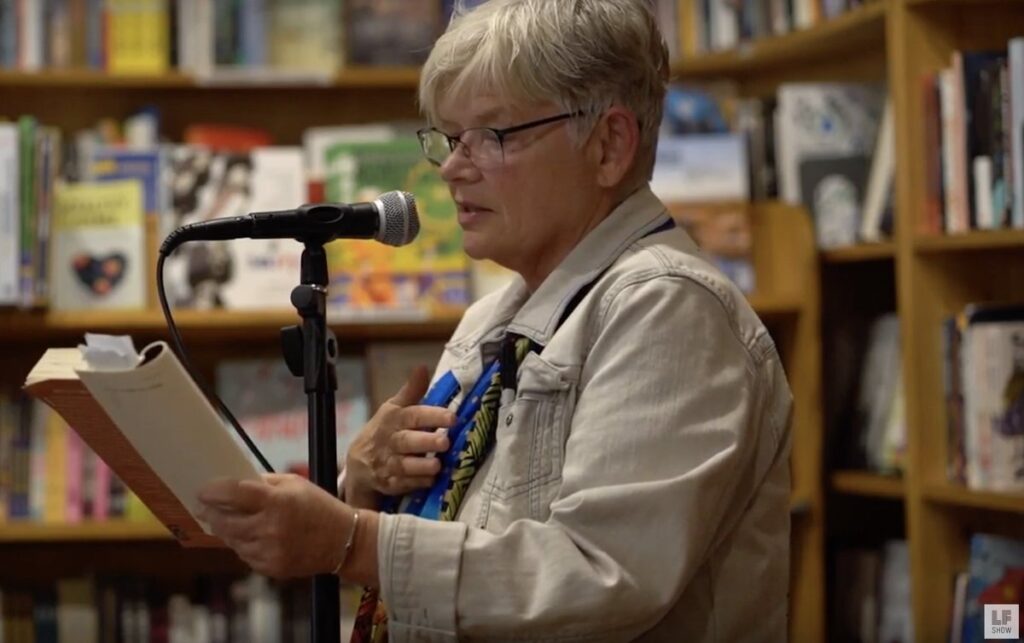
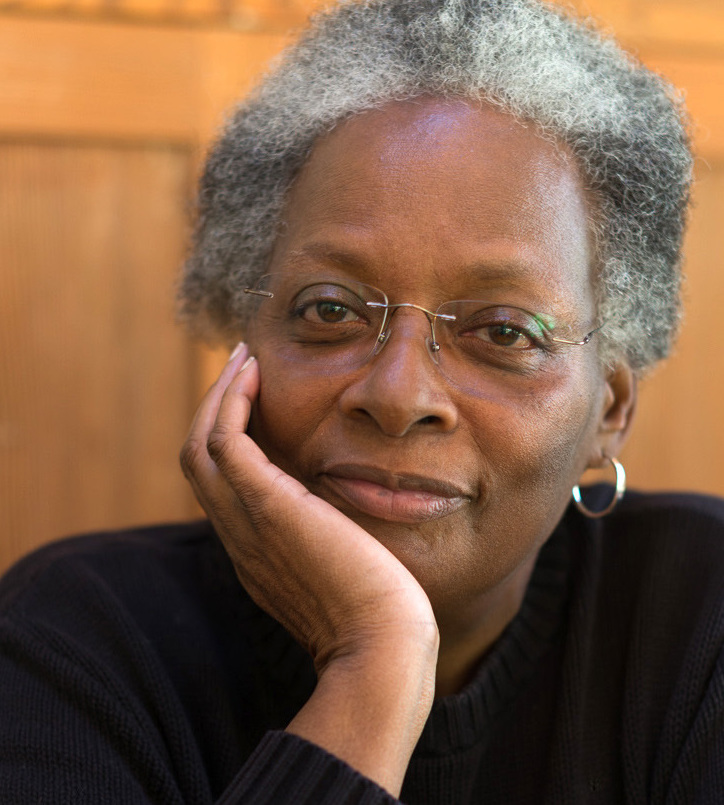
Mandy Carter, born in 1948, speaks from her fifty-five years of activism as a Southern, African-American, lesbian activist organizing for social and racial justice. Carter highlights the importance of allies, and she spreads a message of hope that is deeply important in our lives today. Raised in two orphanages and a foster home for her first eighteen years, she attributes the influences of the Quaker-based American Friends Service Committee, the former Institute for the Study of Nonviolence, and the pacifist-based War Resisters League for her sustained multiracial/multi-issue, intersectional organizing. (Read full bio)
Pat Hussain,born in 1950, grew up in Atlanta attending segregated schools. Hussain has been both a debutante and a Marine, and she has been a community organizer since she started stuffing envelopes for the NAACP in high school. She cofounded Atlanta GLAAD (Gay & Lesbian Alliance Against Defamation), served on the National Gay and Lesbian Task Force board, and worked on the 1993 March on Washington. (Read full bio)
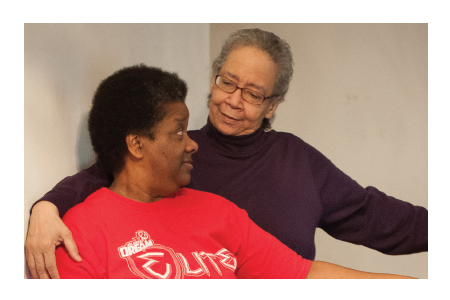
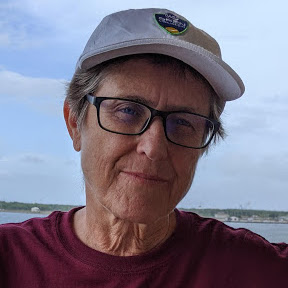
Pam McMichael, born in 1953 (she/her), grew up working class in rural Kentucky. She moved to Louisville, Kentucky, for graduate school. She credits Black and white civil rights leaders there, among others, for bringing her up as a movement person. She has returned to Louisville after serving for twelve years as executive director of the Highlander Center, a historic, civil rights organization based in New Market, Tenessee. She is a cofounder of Showing Up for Racial Justice (SURJ), a founding codirector of Southerners on New Ground (SONG), and a cofounder of the Louisville Fairness Campaign, doing statewide fairness work. (Read full bio)
Suzanne Pharr, born in 1939, Southern, queer feminist and antiracist worker, founded the Women’s Project in 1981 with the goal of eliminating sexism and racism through dismantling systems of violence and economic injustice. Since late 1970s, Pharr’s approach to social change work has been to analyze oppressions as both systemic and intersectional in their makeup and impact, as well as to develop strategies that are inclusive of all affected. (Read full bio)
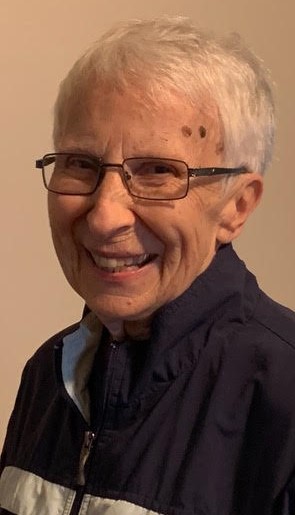
Footnotes
[1]Unless noted, quotations are from interviews. Rose Norman interviewed five SONG cofounders by phone, separately, in 2013. Lorraine Fontana interviewed Pat Hussain in person in 2013. Phyllis Free synthesized the six, long interviews into one composite interview for Sinister Wisdom, “Southerners on New Ground (SONG): 1993-Present,” Sinister Wisdom 93 (Spring 2014): 119-26.
[2] From email to Rose Norman, January 31, 2022.
[3]See Carla Wallace, “The Fairness Campaign: Winning LGBTQ Rights by Building an Antiracist Majority,” Sinister Wisdom 93 (Spring 2014): 84-87.
SONG on the Web
Influence Watch (as of 2017), https://www.influencewatch.org/non-profit/southerners-on-new-ground/
SONG End of Year Report (December 2019), https://southernersonnewground.org/wp-content/uploads/2019/12/EOY-Report-2019-English-1.pdf
SONG on Facebook, https://www.facebook.com/ignitekindred
SONG membership form online, https://database.southernersonnewground.org/donate
SONG on Vimeo, https://vimeo.com/ignitekindred
SONG records for 1993-2015 are archived at Duke University, https://archives.lib.duke.edu/catalog/song
